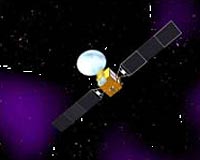 |
Tokyo, Japan (SPX) Jan 26, 2010 The Japan Aerospace Exploration Agency (JAXA) conducted a nickname campaign for the first Quasi-Zenith Satellite (QZS-1) between to familiarize people with the satellite. Among many suggestions, "MICHIBIKI" was selected as the nickname. Selection result: The chosen nickname is "MICHIBIKI" meaning "guiding" or "showing the way." Reason for selection: "MICHIBIKI" accounted for the highest percentage of proposed names, excluding some names that raised some concerns in terms of third party trademark rights, thus it means the name is supported by many people. Many godparents of "MICHIBIKI" explained their selection reason as the QZS-1 is to show us a correct location using its accurate positioning information, and to guide us toward a futuristic society by establishing the next generation satellite positioning technology in Japan. As the name precisely illustrates the QZS mission, this name was chosen. JAXA will send a certificate to all godparents of "MICHIBIKI" The winner of the trip to the Tanegashima Space Center to see off the QZS-1 launch has been announced on the website of the Space Application Mission Directorate. Recently, a positioning service using a satellite has become essential due to the popularization of mobile phones with the GPS function. However, positioning accuracy is often poor because the view of a GPS satellite is hindered by skyscrapers in urban areas in Japan. The major attribute of the QZS is that it can observe Japan from almost its zenith for a long time. Therefore, combined with the existing GPS, the QZS system can provide a high accuracy positioning service even in urban canyons or mountainous terrain. The QZS system is being developed by JAXA based on the collaboration with Ministry of Education, Culture, Sports, Science and Technology, Ministry of Internal Affairs and Communications, Ministry of Economy, Trade and Industry, and Ministry of Land, Infrastructure, Transport and Tourism (MLIT), and also in corporation with related research organizations namely National Institute of Information and Communications Technology, National Institute of Advanced Industrial Science and Technology, Geographical Survey Institute of the MLIT, and Electronic Navigation Research Institute.
What can the QZS System do? (2) Further boost the GPS: The QZS is to send an accurate correction signal to improve the accuracy of the GPS. By receiving signals from the QZS, GPS users will be able to know more precise position information. Therefore, it is expected that we can conduct very accurate positioning all over Japan. (GPS reinforcement)
Related Links QZS GPS Applications, Technology and Suppliers
 China Aiming To Have Its Own GPS In Place By 2012
China Aiming To Have Its Own GPS In Place By 2012Beijing, China (XNA) Jan 18, 2010 China is in a rush to build its version of the Global Positioning System (GPS), by planning to launch 10 Beidou navigation satellites between now and 2012, a newly launched official website said. "The Beidou (Compass) Navigation Satellite System, which will be completed in 2020 with 35 satellites, will enable China to shake off its dependence on GPS and achieve huge economic benefits," Pan ... read more |
|
| The content herein, unless otherwise known to be public domain, are Copyright 1995-2009 - SpaceDaily. AFP and UPI Wire Stories are copyright Agence France-Presse and United Press International. ESA Portal Reports are copyright European Space Agency. All NASA sourced material is public domain. Additional copyrights may apply in whole or part to other bona fide parties. Advertising does not imply endorsement,agreement or approval of any opinions, statements or information provided by SpaceDaily on any Web page published or hosted by SpaceDaily. Privacy Statement |